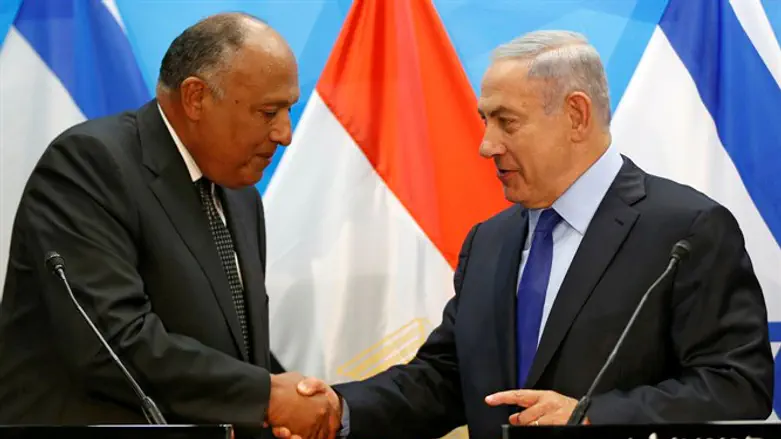
Egypt's foreign minister is meeting with Prime Minister Binyamin Netanyahu Sunday for the first such visit to Israel in nearly a decade that is the latest sign of warming ties.
The "lengthy talks" are touted as largely revolving around reviving peace talks with the Palestinian Authority, but will most likely also focus on what Israel's military recently saluted as "unprecedented" intelligence cooperation with Egypt to combat jihadists of the Islamic State (ISIS) terror group, as well as Islamist terrorism in Gaza.
Speaking ahead of their meeting, Egyptian Foreign Minister Sameh Shoukry assured that "Egypt's commitment to supporting a just, comprehensive and sustainable resolution to the Palestinian-Israeli conflict, to supporting peace and security in the Middle East, is a steadfast and unwavering commitment, and that the Egyptian leadership is serious in its determination to provide all possible forms of support in order to achieve this noble goal.
He said the talks with Netanyahu would also cover "a number of political issues relating to bilateral relations," adding that he was "confident that this will be a fruitful discussion of mutual benefit.
Shoukry's trip to Israel comes after he visited the city of Ramallah in Samaria on June 29 for talks with PA leaders.
Netanyahu confirmed the visit at the start of a cabinet meeting on Sunday and said the last such trip by an Egyptian foreign minister was in 2007.
There would be two meetings - one already underway on Sunday afternoon and an additional one in the evening.
"This visit is important for several reasons," said Netanyahu.
"It reflects the change in relations between Israel and Egypt, including President Sisi's important call to advance the peace process with the Palestinians and with Arab countries."
Egyptian President Abdel Fattah al-Sisi said in May that there was a "real opportunity" for an Israeli-Palestinian deal that could lead to warmer ties between his country and Israel.
Sisi urged Israelis and Palestinians to seize what he said was a "real opportunity" and hailed his own country's peace deal with Israel.
The Egyptian statement on Sunday said the two would discuss "laying the foundation and specifics of confidence-building between Palestinians and Israelis to create a supportive environment to resume direct negotiations between them with the aim of reaching a comprehensive and just solution."
Intelligence cooperation
In 1979, Egypt was the first Arab country to sign a peace treaty with Israel after years of conflict, and it remains an influential player in the region.
In June, representatives from 28 Arab and Western countries, the Arab League, European Union and the United Nations met in Paris to discuss ways of imposing a "two-state solution," at a conference to which neither Israel not the PA were invited.
Israel strongly opposes that initiative, which is being promoted by France, saying the only way forward towards peace is via bilateral negotiations, not imposed solutions.
Netanyahu has at the same time spoken of reviving a long-dormant Arab peace initiative dating to 2002.
The proposal essentially calls for Israel to withdraw from Judea and Samaria and resolve the issue of refugees with the Palestinians, leading to the creation of a Palestinian state, in exchange for normalized relations with Arab countries.
But some analysts have questioned whether Netanyahu's comments were a bid to fend off international critics over his appointment of Defense Minister Avigdor Liberman - who, despite his own endorsement of a two-state solution, is often portrayed as "hardliner" - and his strong opposition to the French peace initiative.
He has said he would seek changes to the Arab proposal. The Arab League has said the terms cannot be changed.
Egypt and Israel have cooperated in other areas, particularly with jihadist terrorists in Egypt's Sinai peninsula having pledged allegiance in November 2014 to Islamic State.
In April, the Israeli military's deputy chief of staff spoke of an "unprecedented level of cooperation" with Egypt, mainly regarding intelligence.
Major General Yair Golan said "there is a strong feeling in the region... that we have to put aside past animosities and concentrate on mutual interests and working together" to deal with the jihadist threat.
However, he cautioned "that's between defence establishments, and I wouldn't describe that as some sort of reconciliation between the people.
"But it is a good starting point, and I'm quite optimistic concerning that."
AFP contributed to this report.